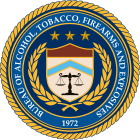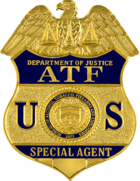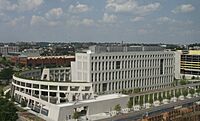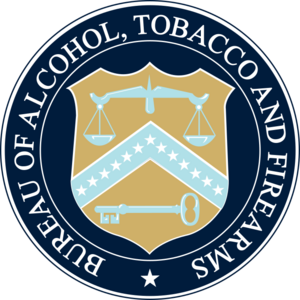Bureau of Alcohol, Tobacco, Firearms and Explosives facts for kids
Quick facts for kids Bureau of Alcohol, Tobacco, Firearms and Explosives |
|
|---|---|

Seal of the ATF
|
|

ATF agent badge
|
|

Flag
|
|
| Common name | Alcohol, Tobacco and Firearms |
| Abbreviation | ATF |
| Agency overview | |
| Formed | July 1, 1972 |
| Preceding agency |
|
| Employees | 5,285 (2021) |
| Annual budget | Approx. US$1.5 billion (2021) |
| Jurisdictional structure | |
| Federal agency | United States |
| Operations jurisdiction | United States |
| General nature | |
| Operational structure | |
| Headquarters | Ariel Rios Federal Building, Washington, D.C.  |
| Agency executive |
|
| Parent agency |
|
The Bureau of Alcohol, Tobacco, Firearms and Explosives (BATFE), usually called the ATF, is a special police agency in the United States. It is part of the United States Department of Justice. The ATF's main job is to investigate and prevent federal crimes. These crimes involve the illegal use, making, and owning of firearms and explosives. They also look into arson (setting fires on purpose) and bombings. The ATF also works to stop illegal buying and selling of alcohol and tobacco products, and helps prevent people from avoiding taxes on them.
The ATF also gives out licenses for selling, owning, and moving firearms, ammunition, and explosives between states. They often work with local police teams to fight crime. The ATF has a special lab in Beltsville, Maryland, where they can rebuild crime scenes involving arson to understand how fires started. In 2021, the ATF had over 5,200 employees and a budget of nearly $1.5 billion.
Contents
History of the ATF
The ATF has a long history, starting way back in 1886. It began as the "Revenue Laboratory" within the U.S. Treasury Department. At first, its main job was to collect taxes on alcohol and tobacco.
From Prohibition to Today
In 1920, a law called the Volstead Act started a period known as Prohibition in the United States. During this time, making and selling alcohol was illegal. A special group called the Bureau of Prohibition was formed to enforce this law. After Prohibition ended in 1933, this group became the Alcohol Tax Unit (ATU).
In 1942, the ATU also became responsible for enforcing federal laws about firearms. In the 1950s, it was renamed the Alcohol and Tobacco Tax Division (ATTD).
In 1968, with new gun control laws, the agency changed its name again to the Alcohol, Tobacco, and Firearms Division. This is when people started calling it "ATF." In 1970, new laws about explosives and bombings were added to their responsibilities.
Becoming an Independent Agency
On July 1, 1972, the ATF officially became its own independent agency within the Treasury Department. Its main focus shifted to enforcing federal firearms and explosives laws to fight violent crime. However, they still collected billions of dollars in alcohol and tobacco taxes.
After the September 11, 2001, attacks, a new law moved the ATF from the Treasury Department to the United States Department of Justice. Its name was changed to the Bureau of Alcohol, Tobacco, Firearms, and Explosives. Even with the longer name, everyone still calls it "the ATF." At this time, the job of collecting taxes on alcohol and tobacco went to a new agency called the Alcohol and Tobacco Tax and Trade Bureau (TTB).
What the ATF Does
The ATF works to keep communities safe by focusing on several key areas.
Investigating Crimes
ATF agents investigate serious crimes involving guns, explosives, arson, and illegal tobacco and alcohol. They work to find out who committed these crimes and bring them to justice.
Stopping Illegal Gun Sales
The ATF works to stop illegal gun sales. They try to prevent guns from getting into the hands of criminals. They also trace guns found at crime scenes to find out where they came from.
Investigating Explosives and Arson
The ATF is a leading agency in investigating bombings and arsons in the U.S. They have experts who can figure out how bombs were made and how fires were started on purpose. They also train military personnel on how to recover evidence after a bombing.
Regulating Industries
The ATF also regulates industries that deal with firearms and explosives. This means they issue licenses to gun sellers and inspect businesses to make sure they follow the rules.
Firearms Licensing
The ATF gives out Federal Firearms Licenses (FFL) to people and businesses that sell guns. They also inspect these licensed sellers to make sure they are following the law.
Tracing Crime Guns
The ATF has a huge system called the National Tracing Center. They can trace guns found by police to find out who made or imported them, and who first bought them. This helps link suspects to crimes and find patterns in illegal gun trafficking. They use a special online system called eTrace for this.
Ballistics Information
The ATF uses a system called the National Integrated Ballistic Information Network (NIBIN). This system allows law enforcement agencies to take pictures of bullets and shell casings found at crime scenes. They can then compare these images to a database to find matches, which helps solve crimes.
Explosives Regulation
The ATF also regulates explosives. They make sure that people who use or possess explosives have the right federal licenses. This helps prevent explosives from being used for illegal purposes.
ATF Personnel and Training
The ATF has different types of employees who each play an important role.
Special Agents
ATF Special Agents are like detectives. They investigate crimes, work to prevent terrorism, and team up with local police to reduce violent crime. They carry firearms and can make arrests. They are the main investigators for federal crimes involving guns or explosives. Special Agents need a high-level security clearance and go through detailed background checks.
Industry Operations Investigators
Industry Operations Investigators (IOIs) are very important for the ATF's job of regulating businesses. They inspect gun and explosives dealers, importers, and manufacturers. They make sure these businesses follow federal laws and rules.
Training for Agents
New ATF Special Agents go through a tough training program in Glynco, Georgia. It has two parts:
- Criminal Investigator Training Program (CITP): This part teaches basic skills for criminal investigations, like using firearms, physical techniques, driving, interviewing, and managing crime scenes. It lasts about 12 weeks.
- Special Agent Basic Training (SABT): This part focuses on skills specific to the ATF, such as identifying firearms and ammunition, investigating gun trafficking, and handling explosives and arson cases. It also includes tactical training and physical fitness. This part lasts about 15 weeks.
Industry Operations Investigators also have their own 10-week training program to learn how to do their inspections effectively.
ATF Leadership
The ATF is led by a Director. Here are some of the people who have served as Director since 1972:
- 1970–1978: Rex D. Davis
- 1979–1982: G. R. Dickerson
- 1982–1993: Stephen Higgins
- 1993–1999: John Magaw
- 1999–2004: Bradley A. Buckles
- 2004: Edgar A. Domenech (acting)
- 2004–2006: Carl Truscott
- 2006: Edgar A. Domenech (acting)
- September 2006 – January 20, 2009: Michael Sullivan (acting)
- January 20, 2009 - April 8, 2009: Ronald "Ronnie" A. Carter (acting)
- April 8, 2009 – August 30, 2011: Kenneth E. Melson (acting)
- August 31, 2011 – March 31, 2015: B. Todd Jones
- April 1, 2015 – April 30, 2019: Thomas Brandon (acting)
- May 1, 2019 – June 3, 2021: Regina Lombardo (acting)
- June 4, 2021 – April 25, 2022: Marvin Richardson (acting)
- April 25, 2022 – July 13, 2022: Gary M. Restaino (acting)
- July 13, 2022–Present: Steve Dettelbach
ATF Locations
The ATF has 26 main offices, called field divisions, in major cities across the United States. These include Atlanta, Chicago, Los Angeles, New York City, and Washington, D.C. They also have offices in other countries like Canada, Mexico, and Colombia.
Images for kids
See also
 In Spanish: Agencia de Alcohol, Tabaco, Armas de Fuego y Explosivos para niños
In Spanish: Agencia de Alcohol, Tabaco, Armas de Fuego y Explosivos para niños
- Drug Enforcement Administration (DEA)
- Federal Bureau of Investigation (FBI)
- List of United States federal law enforcement agencies
 | William L. Dawson |
 | W. E. B. Du Bois |
 | Harry Belafonte |




